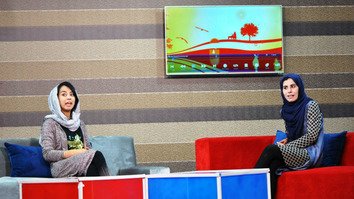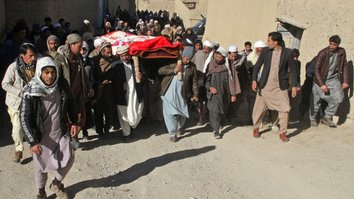KUNDUZ -- Roughly two-thirds of the TV and radio media outlets in Kunduz province have closed since August, as officials stonewall journalists and female workers quit.
Of the 12 private radio stations operating before the fall of the previous government, only four continue to operate -- Radio Zuhra, Radio Kunduz, Radio Roshani and Radio Kohandazh, according to media officials.
Meanwhile, of the four existing TV stations, only two -- Organus and Khawar -- are currently broadcasting.
Under the previous government, media outlets could generate revenue to satisfy their internal expenses by running advertisements and hosting programmes focused on economy and finance, said Akmal Rahmani, director of Khawar TV in Kunduz province.
![Two women host a live show last July 20 in Kunduz city. [Muhammad Qasem/Salaam Times]](/cnmi_st/images/2022/02/10/33980-img_1245-585_329.jpg)
Two women host a live show last July 20 in Kunduz city. [Muhammad Qasem/Salaam Times]
Now, a lack of revenue and of financial support has forced media outlets to cease their operations and close their offices, he said.
"We have been unable to pay our employees for the past five months. Realistically speaking, when there are no funds or resources, workers will not report to work because they have to find other ways to feed their dependents," Rahmani said.
Media outlets are also encountering other pressing challenges, including an increase in taxation, more frequent licence and permit renewal requirements, and rising electricity bills, according to Shahbaz Saberi, chairman of the Afghan Journalists Safety Committee in Kunduz province.
"Under the current difficult circumstances in which there is no income, instead of exempting media outlets from debt ... there is more pressure on them to pay their dues and renew their broadcasting and frequency licences," he said.
Mohammad Shakir Afzali, a reporter in Kunduz who previously worked with a local radio station, lost his job after the previous government fell.
"I lost my job when the radio station stopped its operations. I am now jobless and wondering how to carry on and manage my life," he said.
"If I find the opportunity to continue my job, I will do so. Otherwise, I will have no other option but to replace my pen with a shovel and leave my profession as a journalist and become a labourer to feed my family," Afzali said.
"We call on the international community not to abandon Afghan media outlets and journalists but instead to continue to support independent media and safeguard freedom of speech in Afghanistan," he added.
Fear, intimidation
Meanwhile, the remaining reporters in Kunduz have increasingly found themselves stonewalled by officials.
Local government officials are not co-operating with reporters whatsoever, according to Sayed Karim Dashti, a local reporter in Kunduz province.
"I have repeatedly contacted local authorities to get certain information while preparing my reports. However, they have always refused to speak with me," he said.
"The majority of authorities tend not only to reject media interview requests but also refuse to provide information to reporters and media outlets despite our assurances that we are operating impartially," said Dashti.
"If we want to gauge the public's perception and report on current economic challenges, uncertainty about the future and unemployment, nobody dares to speak with us because of fear and intimidation," Dashti added.
Journalists and media workers in Kunduz are facing restrictions and censorship, and are being denied access to information, Mohammad Zahir Shirzad, a local reporter in Kunduz province, told Salaam Times.
"Previously, everyone was interested in talking to the media and expressing their problems. But now, very few people agree to be interviewed and raise their voices," he said.
"Access to information in Kunduz has been restricted substantially, and this has forced many media outlets to cease their operations," he added.
"Needless to say, we cannot report independently."
"It is impossible to get an official viewpoint on issues. Hence, our efforts to produce a report stall," he said.
Media outlets shut down
The past few months have also seen some 100 female journalists quit their jobs in Kunduz province.
After the fall of the previous government, dozens of female reporters either lost their jobs, were forced to flee the province or go into hiding because of restrictions on their activities, said Saberi.
"At least three to eight female workers used to work for each media outlet as producers, reporters or anchors on news programmes about sports, society, political affairs and entertainment," he said.
"However, with the fall of the previous government, as many as 100 female reporters have lost their jobs," Saberi said.
"Women were technically undertaking the majority of media activities in radio and TV outlets," he added.
"There were four private radio stations for women in Kunduz ... run by women. Unfortunately, these stations have all ceased operations at the moment," he said.
"[Women's] participation is very important in the media landscape," Saberi said, adding that female journalists are effective in drawing attention to women's problems.








The freedom of expression must not be strangled. Let the radios and televisions broadcast useful programs. Instead of shutting down the media outlets, provide them with plans to broadcast better programs.
Reply1 Comment